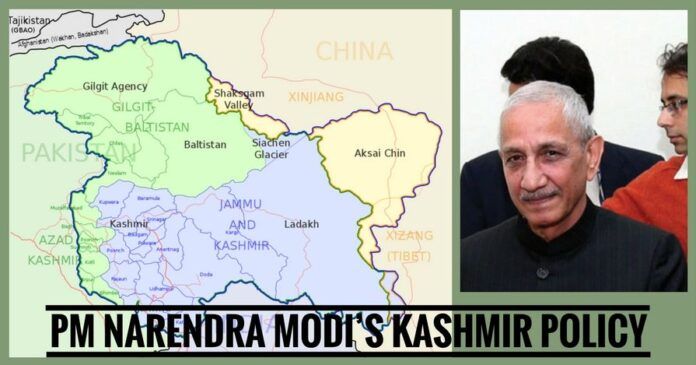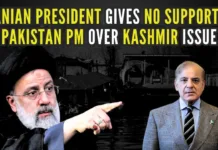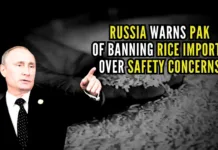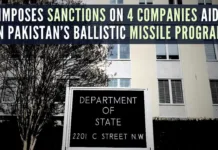
The general view is that any concession to Pakistan and separatists from Kashmir would only lead to third communal partition of India
On October 23, Narendra Modi-led Government announced the appointment of former Intelligence Bureau (IB) Director, Dineshwar Sharma, as interlocutor for the sensitive and strategic State of Jammu & Kashmir. The announcement was made by Union Home Minister Rajnath Singh. “The Government has decided to start a sustained dialogue on Kashmir,” said Rajnath Singh. It was not a U-turn. Nor did it surprise any Kashmir-watcher. Narendra Modi was always for dilution of India’s age-old stand on Jammu & Kashmir and for a compromise with Pakistan. He did what his predecessors like Atal Bihari Vajpayee and Manmohan Singh had done to provide oxygen to Kashmiri separatists when they were almost down and out.
March 1, 2015, PDP-BJP agenda of alliance and the Prime Minister Narendra Modi’s December 25, 2015, visit Lahore were two clear indications that he wanted to strike a deal with Pakistan at any cost. But much to his chagrin, it was Pakistan which created problems for Prime Minister Narendra Modi. His Pakistani counterpart Mian Nawaz Sharif didn’t reciprocate his unilateral gestures. Both Islamabad and Rawalpindi used terror tactics to the hilt to bleed India by a thousand-cut on a daily basis. What they did to bleed India after December 25 still lingers in the minds of the Indians. Suffice it to say that Pakistan not only violated the Line of Control (LoC) and International Border almost daily, liquidated dozens of civilians and jawans and caused displacement of population in Jammu province, but also attacked vital air force and army installations deep inside India as, for example, Pathankot and Gurdaspur in Punjab and Nagrota and Uri in Jammu & Kashmir terror attacks.
Dineshwar Sharma gave a clear hint that he would also talk to Hurriyat leaders. “My doors are open for all. Let’s hope for the best,” he said
Anyway, making the announcement in New Delhi, Rajnath Singh said that the interlocutor will have full freedom to talk to anybody in Jammu & Kashmir. He also gave a clear hint that if the interlocutor so liked he could also engage with separatists. He didn’t lay down any precondition, a mind-boggling departure.
Rajnath Singh and the just-appointed interlocutor sought to give the nation to understand that the whole objective behind the new initiative was to “engage with all walks of life in the state and understand their legitimate aspirations”. Rajnath Singh attributed the new initiative to Prime Minister Narendra Modi, who on August 15, 2017, had “underlined his policy and intention towards Jammu & Kashmir”. And, a day later, Dineshwar Sharma gave a clear hint that he would also talk to Hurriyat leaders. “My doors are open for all. Let’s hope for the best,” he said.
It was absolutely clear from what Rajnath Singh and Dineshwar Sharma said that the Narendra Modi government, like the earlier dispensations, including those of Atal Bihari Vajpayee and Manmohan Singh, believes in the policy of incremental concessions to Pakistan and Kashmiri Muslims. And, this, notwithstanding the fact that this policy instead of producing the desired results only provided more oxygen to the enemies of the nation.
Jitendra Singh, who represents Jammu’s Udhampur Lok Sabha constituency, made an important revelation that “the dialogue process was always going on in Jammu & Kashmir”
A report in The Hindu (Oct 24) suggested that it was on October 17 that National Security Advisor Ajit Doval, Home Secretary Rajiv Gauba, Director, IB, Rajiv Jain and other senior officials and Jammu & Kashmir Chief Minister Mehbooba Mufti discussed the whole issue at her Akbar Road residence in Delhi and decided to start a “new political process in the state”. On the other hand, MoS in PMO Jitendra Singh, who represents Jammu’s Udhampur Lok Sabha constituency, made an important revelation. He disclosed that “the dialogue process was always going on (in Jammu & Kashmir) and that “now it has been sought to institutionalise the process by appointing a senior officer for a ‘sustained’ dialogue with all stakeholders”.
As was expected, the votaries of self-rule, Indo-Pakistan joint-control over Jammu & Kashmir, demilitarisation, greater autonomy, soft or porous borders and irrelevant Line of Control (LoC) and limited accession took no time to hail the Narendra Modi Government’s unsettling initiative. The ruling Peoples Democratic Party (PDP), the National Conference (NC), the Congress, the Communist Party of India, Marxist (CPI-M), to mention only a few, welcomed the announcement. Former Union Home Minister P Chidambaram even described the announcement as the victory of the Congress. And NC working president and Leader of Opposition in the Jammu & Kashmir Legislative Assembly, Omar Abdullah, even went to the extent of taunting those who were opposed to any kind of dialogue on Jammu & Kashmir on the ground that it was a settled issue and that the only issue which still remained unresolved between India and Pakistan was the determination of the political future of the Jammu & Kashmir territories, which had been under the illegal occupation of Pakistan since October 1947.
As for Pakistan and its Kashmir-based agents like Syed Ali Shah Geelani, Mirwaiz Umar Farooq and Yasin Malik, they also conducted themselves on expected lines. Pakistan rejected outright the Narendra Modi Government’s new initiative, saying it wanted the resolution of Kashmir as per the UN resolutions and not interlocutor. And its lackeys in Kashmir have thought it politically prudent to reserve their reaction and response. They want more than what Prime Minister Narendra Modi was always willing to give.
Who in the world doesn’t know that all Kashmiri Muslim leaders, separatists and “mainstream” included, hate the Indian Constitution and want a dispensation that is Pakistan-like?
Rajnath Singh’s statement that interlocutor Dineshwar Sharma will meet all stakeholders in Jammu & Kashmir to “understand their aspirations” was as amusing as it was ludicrous. Who in the world doesn’t know that all Kashmiri Muslim leaders, separatists and “mainstream” included, hate the Indian Constitution and want a dispensation that is Pakistan-like? They want nothing less than Nizam-e-Mustafa. Similarly, who in the world doesn’t know that the Hindus of Jammu and Buddhists of Ladakh, who together are almost 6 million, long for a regime that integrates them fully into India, separates them from Kashmir and gives them definite political instruments invested with full legislative, executive and financial powers. In effect, the demands of the people of Jammu province range from the status of statehood to regional council to regional autonomy and the single-point agenda of Buddhists of Ladakh is to obtain a status of Union Territory.
The BJP’s whole approach towards Pakistan and Jammu & Kashmir are fraught with dangerous ramifications. It is against the national sentiment, which is vehemently opposed to the idea of granting any concession to Pakistan and Kashmiri separatists. The general view is that any concession to them would only lead to a third communal partition of India and the result would be India’s disintegration and Balkanization. The view is well-founded. In sum, it can be said that Prime Minister Narendra Modi is playing with fire.
Note:
1. The views expressed here are those of the author and do not necessarily represent or reflect the views of PGurus.
- ‘Kashmir My core constituency’: Revisiting July 12, 2003 to understand politics, Omar Abdullah-style - March 15, 2024
- Total deviation from traditional approach: Seven takeaways from PM Modi’s March 7 Srinagar visit - March 9, 2024
- Status of political parties: Why is further J&K reorganization imperative? - March 1, 2024











No point. Hindus are destined to suffer. Always.